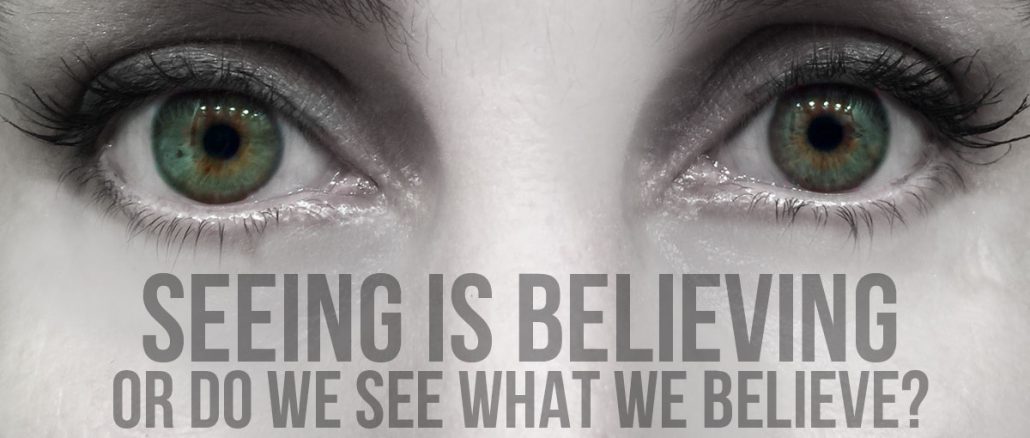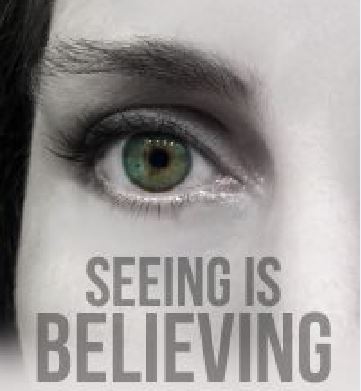Seeing Is Believing Or Is It?
Do You Believe What You See Or Do You See What You Believe?
“Why is this taking so long...if seeing is believing I can’t see this happening…?”
I was walking on the beach this morning enjoying the sound of the sea
lapping on the shingle. My mind was in neutral and I was feeling
gratitude for such a beautiful morning and for the blessing of living by
the coast.
My thoughts drifted and wandered to the realisation
of one my most cherished objectives, and then to the business deal that
could make that possible… and then I was mulling over how this business deal may or may not succeed.
My
thoughts then drifted further into analysis of how much this mattered
to me and all the good things that depended on getting the result I
wanted. I thought of how a successful outcome would enable me to help a
particular person I have been mentoring.
Then I started getting frustrated and within
only a few short minutes my peace of mind and present moment awareness
was shattered and I was feeling tense, anxious and resentful.
Seeing Is Believing, Or Is It?

Like the characters in "The Matrix" we are fooled by the illusion that what we see is how things really are. Why? Because this is the mind's default setting. It sees:
- Things “out there”
- A world of circumstances and events and situations
- The present moment through the lens of its own inner map of reality which it links up seamlessly with its memory of a past and it conjecture and projection of a future
- We confuse this inner map of reality with the world as it is
On this site, we place a lot of emphasis on learning how to think effectively and also on learning and practicing the art of not thinking.
Why? Because a quiet mind is an insightful mind and a resourceful mind.
The most effective way of achieving a quiet mind is with the zen practise of mindfulness.
The purpose of this:
- Is not to suppress your thinking but to surpass it
- To experience that you are not your thoughts
- To learn how to respond to your thoughts in the most insightful and resourceful way
- To ensure that over the long term you optimise the outcomes that you experience
As you become more mindful, you become aware that in the gaps between your thoughts, you are far more than the limited and conventional sense of self of your egoic mind.
If you continue with this practice you come to realise that we are spiritual or energetic beings
and that we really are all interconnected and part of one all-embracing
everything.
It sounds dramatic, but to some degree, the walls of separation fall away - or at least weaken.
Seeing Is Believing And The Power Of Expectation

The Power Of Expectation Of An Outcome Regardless Of The Lack Of Any Substance To That Expectation.
The placebo effect is based on the
power of belief and expectation of an outcome regardless of the lack of
any substance to that belief or expectation. Considerable research has been undertaken on this and there is a body of evidence that suggests that expectation can have a significant impact on outcome.
This
is not magical thinking, but the interaction of your mind and body and
the positive neurological benefits that can be generated by your belief
and expectation.
How you feel has a major effect on how you think and behave.
How you think and behave has a significant effect on the quality of your response to the events in your life. It is the cumulative effect of these responses that shape your long term life experience.
In an earlier article I shared a personal experience of this where I was grounded in, and fixated on, circumstances.
I was looking outside of myself to circumstances seeking evidence of how I could believe that my intentions were possible.
Eventually
I realised that belief, or expectation, was an internal state, and that
my experience of life was ultimately dependent on that.
Seeing Is Believing & Dropping the "How?"

Letting go and dropping the “How?” is hard for the ego because it is fixated on seeing is believing and letting go is an act of surrender – of giving up control.
Also
it is a matter of temperament. Those of us who see ourselves as the
leader and in charge can find it particularly difficult. Often we can
only really let go when we reach a stage of desperation.
Alternatively, we can use the following less dramatic and less stressful two-step approach:
[1] The cognitive context
Remind yourself that:
- We live in and are part of an energetic universe
- We live in and are part of a participatory universe
[2] The practice
- Make peace with the present moment by accepting what is.
- Give thanks and express gratitude for what is - regardless of circumstances.
- See the end result and the outcome you seek; see it, feel it, and say thank you.
- Take Action - and act on inner prompts, guidance and intuitions as they arise and do so to very the best of your ability.
- Don't think about it and let go of attachment to the outcome.
- Finally, and most importantly - The Gestation Period - understand it, believe in it, accept it and persist through it.
Further Reading:
The Greatest Love - The Most Important Relationship You Will Ever Have
Next Article: What Difference Did You Make?
Return from "Seeing Is Believing" to: Walking The Talk
Or return to: What Is Spirituality?
LATEST ARTICLES
The Inner Weight of Shame - Sustained By Attentional Fixation
 A Mind That Is Continuously Engaged In Self-Surveillance. Shame is one of the heaviest inner burdens a human being can carry. It does not announce itself loudly or demand attention through drama. Inst…
A Mind That Is Continuously Engaged In Self-Surveillance. Shame is one of the heaviest inner burdens a human being can carry. It does not announce itself loudly or demand attention through drama. Inst…Does Prayer Work? The Psychology of Prayer, Meditation and Outcomes
 Reality Is A Complex System Of Countless Interactions - Including Yours. So does prayer work? The problem is that the question itself is usually framed in a way that guarantees confusion. We tend to a…
Reality Is A Complex System Of Countless Interactions - Including Yours. So does prayer work? The problem is that the question itself is usually framed in a way that guarantees confusion. We tend to a…Living in Survival Mode Without Surrendering Mental Authority
Living in Survival Mode Without Surrendering Mental Authority
 Clear Thinking When You’re Just Trying to Stay Afloat. Many people today are overwhelmed because they are living in survival mode - not temporarily, but as a persistent condition of life. For many, th…
Clear Thinking When You’re Just Trying to Stay Afloat. Many people today are overwhelmed because they are living in survival mode - not temporarily, but as a persistent condition of life. For many, th…Manifestation Without Magic: A Practical Model
 Manifestation without magic is not a softer or more intellectual version of popular manifestation culture. It is a different model altogether. Popular manifestation teachings tend to frame reality as…
Manifestation without magic is not a softer or more intellectual version of popular manifestation culture. It is a different model altogether. Popular manifestation teachings tend to frame reality as…Staying Committed When You Can't See Progress - The Psychology of Grit
 Uncertainty Is Not The Absence Of Progress, Only The Absence Of Reassurance. One of the most destabilising experiences in modern life is not failure, but uncertainty and staying committed when you can…
Uncertainty Is Not The Absence Of Progress, Only The Absence Of Reassurance. One of the most destabilising experiences in modern life is not failure, but uncertainty and staying committed when you can…The Battle For Your Mind - How To Win Inner Freedom In A Digital Age Of Distraction
 From External Events to Inner Events. We often think of “events” as things that happen out there: the traffic jam, the rude comment, the delayed email reply. But what truly shapes our experience is wh…
From External Events to Inner Events. We often think of “events” as things that happen out there: the traffic jam, the rude comment, the delayed email reply. But what truly shapes our experience is wh…How to See Your Thoughts Without Becoming the Story
 A Practical Guide to Thought-Awareness. You can spend your life inside the stories of your mind without ever learning how to see your thoughts clearly and objectively. Most of the stuff we tell oursel…
A Practical Guide to Thought-Awareness. You can spend your life inside the stories of your mind without ever learning how to see your thoughts clearly and objectively. Most of the stuff we tell oursel…The Collison Decision Matrix - A Simple Framework for Better Choices
 The Collison Decision Matrix Is A Practical Everyday Thinking Tool. Most of us spend a surprising amount of time worrying about decisions. From small ones such as what to wear, what to eat, what to te…
The Collison Decision Matrix Is A Practical Everyday Thinking Tool. Most of us spend a surprising amount of time worrying about decisions. From small ones such as what to wear, what to eat, what to te…The Power Of Asking The Right Question
 The Power Of Asking The Right Question Lies In The Quest For Insight. To experience the power of asking the right question you must develop the practice of asking questions. The best way to improve th…
The Power Of Asking The Right Question Lies In The Quest For Insight. To experience the power of asking the right question you must develop the practice of asking questions. The best way to improve th…Site Pathways
 Here is a site pathway to help new readers of Zen-Tools navigate the material on this site. Each pathway is based around one of the many key themes covered on this site and contain a 150 word introduc…
Here is a site pathway to help new readers of Zen-Tools navigate the material on this site. Each pathway is based around one of the many key themes covered on this site and contain a 150 word introduc…How To Live With Contradiction - Beyond Thought Let Stillness Speak
 A major impact on so many peoples' lives is the situational contradiction of unfilled realistic expectations. So where does all this leave us? Well here we are, with mental equipment that is more lim…
A major impact on so many peoples' lives is the situational contradiction of unfilled realistic expectations. So where does all this leave us? Well here we are, with mental equipment that is more lim…
